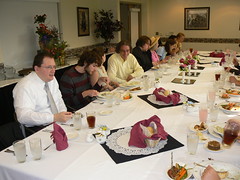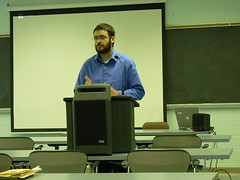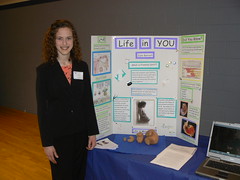Sunday, April 27, 2008
Honors Banquet
Friday, April 18, 2008
Academic Festival 2008
- Tony Arnold Great Works, Great Men: Douglass, King and Christian Clarity. (Humanities/Social Sciences 2nd place)
- Robert Stottlemyer Is Human Justice Truly Just?
- Julie Barrett Life in You.
- Riley Wingert Heat Transfer of a Stirling Engine
- Cayla Amsley and Danielle Sander Political, Religious, and Spritual Views & Opinions About Sexual Activity.
- Christina Zucconi The Effects of Divorce on Familial Relations
Congratulations to all who participated! It's nice to see great minds at work.
For more information on Mont Alto's Academic Festival click here.
Tuesday, February 26, 2008
Discussion on the Nature of Religion
On February 25, 2008, Dr. Louis Hammann, Professor of religion at Gettysburg College, gave a presentation in WSC. The presentation was supposed to be a dialogue on world religions featuring Native American beliefs, between Dr. Hammann and his colleague, Dr. Kenneth Lokensgard, Assistant Professor of Religion at Gettysburg College. However, Dr. Lokensgard was sick and could not participate.
Dr. Hammann instead addressed the question; What is religion?
The answer is so much more complex than a mathematical equation like 3 + 6 = 9. So many things come in to play when discussing religion.
Dr. Hammann established that to an individual, religion is based on personal experience, whether that experience was good, bad, or otherwise. Nearly everyone has experienced religion somehow in life. In today’s growing media, humans are increasingly exposed to the public discourse which defines religion the way it perceives it: religion is just an organization or movement to which people are loyal.
As humans we tend to be habitual beings. Religion can become a habit, a cultural reflex in a human being’s life. How does that habit beneficial? What more is religion? Dr. Hammann says in essence, true religion is a chain of memory. That is we reenact the origin of our religion, trying to have the same experiences as those of the founders of the religion. He used two examples one of Catholicism and the practice of mass, and Buddhism and the practice of meditation.
The presentation was not intended to provide absolute truth or resolution to the question of the ages, it was a challenge for each of us to look into our own lives and analyze what our experience with religion has been. We must each wrestle with what religion means in our own lives and ultimately how it affects the way we live in the world.
Thank you Dr. Hammann for leading the discussion and challenging our thoughts.
Tuesday, February 12, 2008
Challenging Slavery in the Chesapeake -- Author visits Mont Alto
 Although this wasn't strictly an Honors event there were several Honors students in attendance, so it's worth mentioning here.
Although this wasn't strictly an Honors event there were several Honors students in attendance, so it's worth mentioning here.Yesterday, Stephen Whitman spoke to an intimate group at the Mont Alto Library on his book Challenging Slavery in the Chesapeake. The book covers the institution of slavery in Virginia, Maryland, and Delaware from the Revolution to the Civil War.
Whitman asked the question "What did African Americas do to challenge slavery and gain freedom?"
Surprisingly, there was a legal mechanism, called manumission for slaves to buy their freedom. Many worked in their free time to save up enough money to negotiate for their freedom with their masters. This could be a long and tedious process. Yet enough people were able to do this that the States started to limit the procedure.
Whitman argues that the efforts of the slaves helped change how people thought about slavery. Northerners, especially in Pennsylvania, lived with increasing numbers of free blacks. They began to resent the efforts of Southerners to reclaim their lost property. Southerners resented the refusal of the Northerners to help them retain their property. They began to think increasingly in terms of secession from the Union.
Whitman's book challenges us to think about history in a new way. The slaves weren't passive. They worked hard to be free. Actions on the local level had a cumulative effect that changed public opinion against slavery and led eventually to the Civil War. The book is a worthwhile read!
Thanks to the Penn State Mont Alto Library for hosting this book discussion.
Tuesday, December 4, 2007
End of Semester
The students also discussed whether it was better to take an honors-option to a course or an honors only course. Each has its advantages and uses, so there was no firm conclusion as to which was better.
Then on to Scattergories
Tuesday, November 20, 2007
Reflection on the Visit of Bhante Wimala to the MA Honors Students in September

Theravada Buddhist Monk Comes to
Relaxation emanated from the man as he sat comfortably in his chair, his red robe gathering around him. He sipped tea with a natural smile on his face while a circle of people formed in John Bardi’s small upstairs office in the
One might think Bhante Wimala, a well-traveled Theravada Buddhist monk, would get a little nervous with so many inquisitive people crowded around him. All are eager to ask him questions about issues from Christianity to meditation. Bhante, however, shows no signs of stress whatsoever. His laid-back tone seems innate and his content facial expressions permanent. He engages each person he meets as if he were a lifelong friend. In short, he is anomalous in a culture which values quantity over quality, movement over repose, speed over tranquility.
The most beneficial element of Bhante’s visit was discovered in the first few questions. One question was asked in regards to gratitude, which seemed to be of particular importance to Bhante. Bhante began to speak about attitudes different persons seem to have toward life. “I am thankful every day,” Bhante said with a genuine enthusiasm. “I am thankful that I can walk every morning.” He then spoke about a gentleman with no legs he had met in his many travels. The man would line up continuously for a wheelchair and every time he did not get one he would happily leave, saying, “Maybe next time.” Perhaps this was the most potent discussion point in the entirety of Bhante’s meeting. One hears this gracious man--who has little himself and yet is unwaveringly optimistic about life--speak about those who do not have clean drinking water or even all their appendages and one begins to gain a sobriety unknown before. The I-pods, cell phones, and new cars don’t seem to matter so much now and the realization that it is quite sufficient to have a full meal plan and a comfortable dorm room begins to materialize.
The discussion is over now and Bhante bows his head in a reverence to all around him, recognizing the holiness in each human being. He is off to the next step in what has so far been an extensive journey. It is almost sad to see him walk out the door, as if the torch leading one out of the Platonic cave has just been doused. The challenge now is to keep the torch burning and fortify the lessons learned.
By Tony Arnold
Here is a link to Bhante Wimala's home page: http://www.bhantewimala.com/
Saturday, November 17, 2007
Twelfth Night
 Last night five Mont Alto Honors students braved the cold to attend a performance of Shakespeare's Twelfth Night at Wilson College. A traveling troupe from the National Players performed at Laird Hall.
Last night five Mont Alto Honors students braved the cold to attend a performance of Shakespeare's Twelfth Night at Wilson College. A traveling troupe from the National Players performed at Laird Hall.National Players features young actors in the classics. On their web page they are introduced as:
National Players, America’s longest running classical touring company, has now reached its 58th consecutive season of touring. Currently the touring program of Olney Theatre Center for the Arts, National Players has earned a distinctive place in American theater. Committed to the formation of young theatrical talent and audiences, National Players seeks to celebrate the experience of theatergoing by presenting the world’s greatest dramatic literature.
More projection by some of the lead characters, Viola especially, would have improved the performance. It was evident that the actors are still learning their craft. They give promise of a great future and the audience rewarded them with a loud standing ovation at the end.
It helped that we had read the play beforehand. With all the disguises and switching around it is easy to lose track of who is who. Thanks to Dr. Russo for leading the two discussion sessions. Seeing Twelfth Night was well worth delaying the start of the Thanksgiving break.




